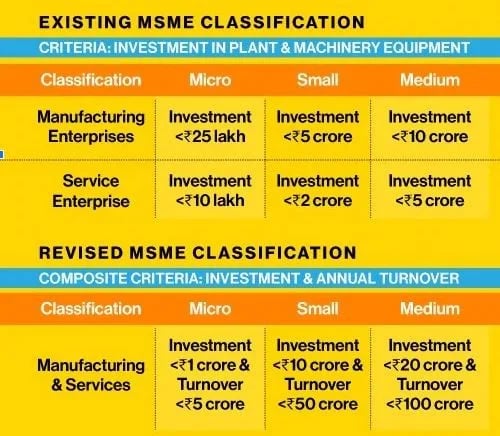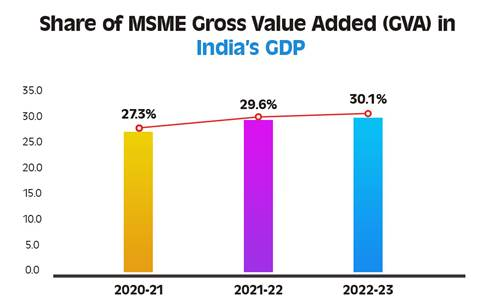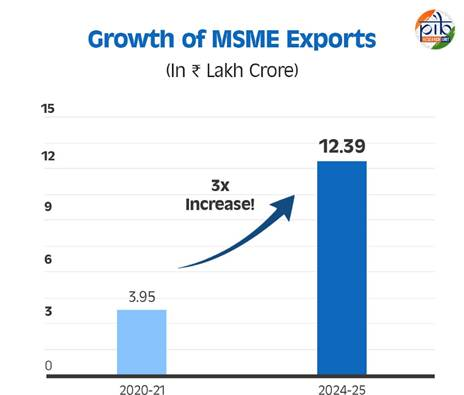Syllabus: GS3/Economy
Context
- World Micro-, Small- and Medium-sized Enterprises (MSMEs) Day is celebrated annually on June 27th with the theme “Enhancing the role of MSMEs as drivers of Sustainable Growth and Innovation.”

Significance of MSMEs
- Globally, MSMEs represent the most dominant segment of the business ecosystem, accounting for nearly 90% of enterprises and over 50% of total employment.
- In India, MSMEs are contributing around 30% to the GDP and over 45% to the country’s exports.
- MSMEs are the second-largest employer in India after agriculture.

- Exports from MSMEs have seen substantial growth, rising from ₹3.95 lakh crore in 2020-21 to ₹12.39 lakh crore in 2024-25.

Challenges Faced by the MSMEs in India
- Limited Access to Credit: Most MSMEs struggle to get loans due to lack of collateral and formal credit history.
- Outdated Technology: Many MSMEs use obsolete technology due to high costs and limited awareness.
- Regulatory Burden: Complex compliance with tax laws, labour regulations, and licenses increases operational difficulty.
- Delayed Payments: Payments from large companies and government buyers are often delayed, affecting MSMEs’ cash flow.
- Low Productivity: Many MSMEs have low productivity due to informal operations and lack of modern practices.
- Skilled Labour Shortage: There is a lack of access to skilled and trained manpower in the sector.
- Limited Market Access: MSMEs struggle with branding, marketing, and reaching wider domestic and global markets.
- Informality and Lack of Data: A large number of MSMEs remain unregistered, making them ineligible for formal support.
- Vulnerability to External Shocks: MSMEs are highly susceptible to disruptions like COVID-19, inflation, and global slowdown.
Key Initiatives to Support MSMEs
- PM Vishwakarma: Launched in 2023, it is a central sector scheme for 2023-24 to 2027-28.
- It aims to uplift traditional artisans and craftspeople by enhancing product quality and connecting them to wider markets.
- Udyam Registration Portal: It was launched in 2020, offers a free, paperless, and self-declared registration process for MSMEs.
- Prime Minister’s Employment Generation Programme (PMEGP): PMEGP is a credit-linked subsidy scheme that supports self-employment by helping set up micro-enterprises in the non-farm sector.
- Scheme of Fund for Regeneration of Traditional Industries (SFURTI): SFURTI was launched in 2005-06 to organise traditional artisans into clusters for improved competitiveness, product development and sustainable income generation.
- Public Procurement Policy for Micro and Small Enterprises: It was notified in 2012 to ensure market access for Micro and Small Enterprises.
- It mandates 25% annual procurement from MSEs by Central Ministries, including 4% from MSEs owned by SC/ST and 3% from MSEs owned by Women entrepreneurs.
- MSME Hackathon 4.0 (2024): Supports 500 young entrepreneurs with funding up to Rs. 15 lakh each for innovation and incubation.
- MSME-TEAM Scheme (2024): A trade enablement initiative with an outlay of Rs. 277.35 crore, supporting 5 lakh MSEs (including 2.5 lakh women-led) in digital onboarding, cataloguing, logistics and packaging.
- Khadi and Village Industries: The Government is promoting the Khadi and Village Industries (KVI) sector through the Khadi and Gramodyog Vikas Yojana (KGVY), a Central Sector Scheme with no state component.
- International Cooperation Scheme: Supports MSMEs in entering global markets by facilitating participation in international fairs, exhibitions and knowledge-sharing events on a reimbursement basis.
Conclusion
- MSMEs are revolutionising India’s growth story by driving innovation, generating employment, and empowering local communities.
- With strong policy support, digital tools, and access to new markets, these enterprises are becoming engines of sustainable and inclusive development.
Source: DD
Previous article
Electoral Rolls for Bihar to be Prepared Afresh